
Headlines
News
Heidelberg Begins Subscription Pricing Model
February 12, 2018 By PrintAction
 WEIG Packaging opts for Heidelberg subscription model (left to right): Siegfried Mahr, Managing Director of WEIG Packaging; Dr. David Schmedding, Head of Corporate & Digital Business Development at Heidelberg; Mike Niebuhr, head of the folding carton plant in Emskirchen; Toni Steffens, Commercial Director of WEIG Packaging; Markus Rinkens, Head of Procurement at WEIG Group; Harald Degen, Branch Heidelberg Munich; and Dirk Kummer, Heidelberg Munich Branch Manager.
WEIG Packaging opts for Heidelberg subscription model (left to right): Siegfried Mahr, Managing Director of WEIG Packaging; Dr. David Schmedding, Head of Corporate & Digital Business Development at Heidelberg; Mike Niebuhr, head of the folding carton plant in Emskirchen; Toni Steffens, Commercial Director of WEIG Packaging; Markus Rinkens, Head of Procurement at WEIG Group; Harald Degen, Branch Heidelberg Munich; and Dirk Kummer, Heidelberg Munich Branch Manager. Heidelberg introduced one of its first customers to invest in the press maker’s new subscription pricing model, which comprising presses, software, services, and consumables under one subscription agreement. The customer is folding-carton producer FK Fürther Kartonagen, based in Mayen, Germany, which forms part of the WEIG network of companies.
This move by Heidelberg fits its growing push toward creating new digital business models, particularly with the company’s new digital packaging (Primefire for carton) and label (Gallus) presses. The subscription model, however, will also be applied to Heidelberg’s industrial offset customers, as the press maker and its customers work together toward productivity and growth targets laid out in subscription agreements.
“Establishing pay-per-use models in industrial offset printing is the result of our company’s ongoing digital transformation, and also our software and data expertise,” said Ulrich Hermann, member of the Heidelberg’s Management Board and its Chief Digital Officer. “Heidelberg offers customers a smart complete system comprising press, services, consumables, and software solutions.
“The stable management of a system of this kind is inconceivable without big data applications – in predictive maintenance, for example – and our Push to Stop approach to autonomous printing,” said Hermann. Heidelberg explains its new subscription model, which will typically be based on 5-year agreements, follows the growing pay-per-use trend in mechanical engineering and aims to move away from growth based solely on selling and installing printing capacity.
Under the Heidelberg subscription model, customers only pay for the number of sheets actually printed. Under a conventional business model, printing companies typically buy the presses and pay separately for consumables or services. With Heidelberg’s new digital business model, all the equipment, all consumables required – like printing plates, inks, coatings, washup solutions and blankets – and a range of services geared to availability are included in the price per sheet to be charged.
Heidelberg explains this new approach also differs significantly from the click-charge model previously introduced by digital press suppliers. Although these suppliers also charge per sheet, explains Heidelberg, they mainly base this on their own costs and not on the customer’s business model.
“Under the Heidelberg subscription model, the economic responsibility for optimum technical availability, increased productivity, and maximum utilization of the installed equipment no longer rests solely with the customer, but for the first time also with the supplier,” said Hermann. “After all, a customer only enters into a long-term agreement with us if the benefits are permanent. We ensure this will be the case with our operator model.”
Under its subscription model agreement with Heidelberg, two new Speedmaster XL 106 presses from the drupa 2016 generation – with Push to Stop and Multicolor technology – are being installed at FK Fürther Kartonagen’s Emskirchen folding-carton plant. The subscription model in its totality also includes all service components, replacement and wear parts, all consumables required to operate the presses, and a training and consulting service aimed at increasing availability. In addition, WEIG is using the new Heidelberg Assistant digitization solution, which went into series production at the end of 2017.
The Heidelberg Assistant is being developed into the central control panel for equipment and components communicating independently. Maintenance requirements and wear will be identified at an early stage, using Heidelberg Assistant, to enable joint predictive service planning. Heidelberg Assistant was initially released in four countries to provide customers with digital support throughout the life cycle of their products.
“We’re looking to turn our Emskirchen site into a folding carton business that leads the way when it comes to availability and flexibility,” said Toni Steffens, Commercial Director of WEIG Packaging. “We’re therefore entering into a partnership with Heidelberg in which our strategic and business interests are aligned. Under the new business model, Heidelberg will no longer make its money by supplying press components, but solely by achieving agreed productivity and growth targets.”
Print this page